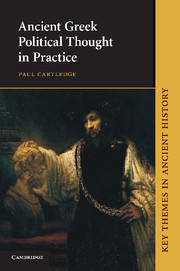Book contents
- Frontmatter
- Contents
- Preface
- Acknowledgements
- Timeline
- CHAPTERS AND NARRATIVES
- 1 Meaning in context: how to write a history of Greek political thought
- 2 The Greek invention of the polis, of politics and of the political
- Narrative I The prehistoric and protohistoric Greek world, c. 1300–750 BCE
- Narrative II The archaic Greek world, c. 750–500 BCE
- Narrative III The classical Greek world I, c. 500–400 BCE
- Narrative IV The classical Greek world II, c. 400–300 BCE
- Narrative V The Hellenistic Greek world, c. 300–30 BCE
- Narrative VI ‘Graecia capta’ (‘Greece conquered’), c. 146 BCE – CE 120
- 10 The end of politics? The world of Plutarch, c. CE 100
- 11 The Greek legacy and democracy today
- APPENDIX I Selected texts and documents
- APPENDIX II The ‘Old Oligarch’: a close reading
- Bibliographical essay
- References
- Index
10 - The end of politics? The world of Plutarch, c. CE 100
Published online by Cambridge University Press: 05 June 2012
- Frontmatter
- Contents
- Preface
- Acknowledgements
- Timeline
- CHAPTERS AND NARRATIVES
- 1 Meaning in context: how to write a history of Greek political thought
- 2 The Greek invention of the polis, of politics and of the political
- Narrative I The prehistoric and protohistoric Greek world, c. 1300–750 BCE
- Narrative II The archaic Greek world, c. 750–500 BCE
- Narrative III The classical Greek world I, c. 500–400 BCE
- Narrative IV The classical Greek world II, c. 400–300 BCE
- Narrative V The Hellenistic Greek world, c. 300–30 BCE
- Narrative VI ‘Graecia capta’ (‘Greece conquered’), c. 146 BCE – CE 120
- 10 The end of politics? The world of Plutarch, c. CE 100
- 11 The Greek legacy and democracy today
- APPENDIX I Selected texts and documents
- APPENDIX II The ‘Old Oligarch’: a close reading
- Bibliographical essay
- References
- Index
Summary
Greek political thought (and theory) did not die with the early Stoics of the third century bce. After Panaetius of Rhodes (2nd century) and Poseidonius of Apamea in Seleucid Syria (1st century bce), however, the torch passed firmly to Rome, in the massy shape of Cicero. His writings, thanks to his golden style, were preserved in bulk and have come down to us more or less intact – minus, somewhat ironically, his treatise De Re Publica, which survives only fragmentarily.
Cicero actually translated Xenophon's Oeconomicus and other more or less philosophical Greek works into Latin, and was in other ways heavily indebted to Greek thinkers for the development of his own brand of philosophising, which, in accordance with Roman pragmatic norms, retained a very close connection indeed to political actuality. For example, in one of his many private letters to Titus Pomponius, nicknamed Atticus (‘the Athenian’), his publisher as well as friend, he made a sneering reference to Cato the Younger – a figure whom he in many ways deeply admired and probably envied for his unbending moral rectitude. Cato spoke, he wrote, as though he were living in the ideal utopian state of Plato's Republic (the Latin translation of Politeia), whereas actually he lived in the Sin City (literally ‘dregs’, faex, plural faeces) of Romulus! Even more than Aristotle, Cicero based his political philosophy on his perception of the world as it really was, and perhaps we should be grateful to him for the unblinking and unflinching manner in which he explicitly identified his personal class interest with the moral welfare of the entire Roman world.
- Type
- Chapter
- Information
- Ancient Greek Political Thought in Practice , pp. 124 - 130Publisher: Cambridge University PressPrint publication year: 2009

